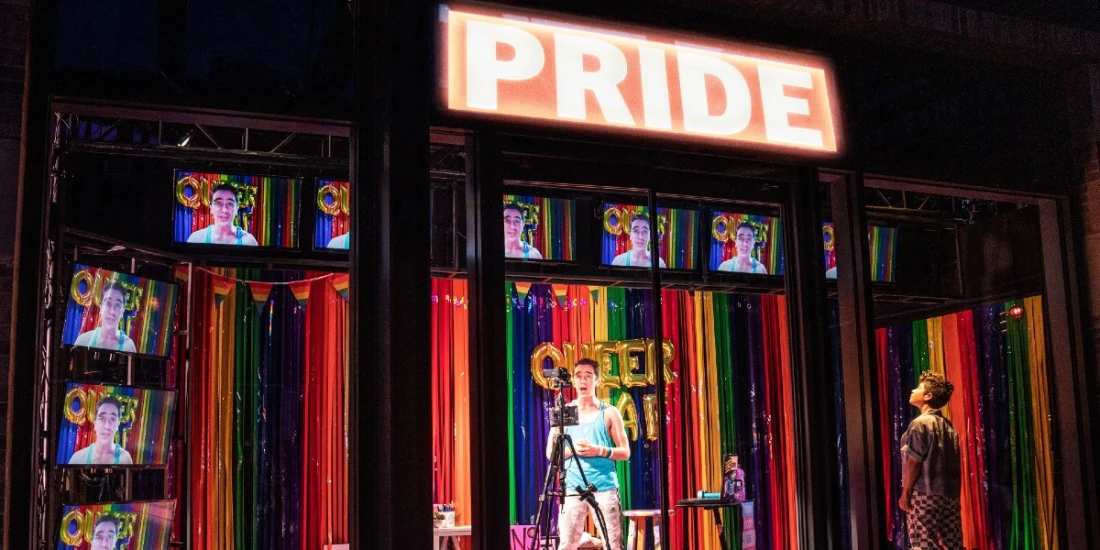‘Seven Deadly Sins’ rouses downtown NYC back to life with shocking, powerful theatre
It's strange to experience a show like Seven Deadly Sins in New York City right now. Performed in multiple storefronts to a guided audience using headsets, the production is a slick, seamlessly stage managed affair. Yet buzzing all around it is, well, chaos — the joy, mayhem and noise of a city returning to tumultuous life.
On a Friday evening heading into Pride weekend, the Meatpacking District, where the show makes its home, was teeming with exultant activity. Many of the partiers maneuvering tipsily around my roving audience were dressed no less wildly than the actors gesticulating to us from behind the glass — sounds cutesy perhaps, but true.
All that to say, Sins has set itself a big challenge. The evening bills itself as a provocative seven-play exploration of the cardinal sins where no subject is taboo. The danger is that it might instead feel like a dalliance in darkness for privileged theatergoers while the very real mess, glory and, yes, sinning of a city re-emerging from trauma — in a neighborhood rich with a history tied to drugs, prostitiution, and sex clubs — buzzes with more geniune edge around it.
Sins avoids this trap thanks to an impressive cadre of playwrights who did not take their assignment lightly. Asked to truthfully tackle one sin in just ten minutes each, these writers have — for the most part — responded with genuinely shocking pieces.
Ming Peiffer's Longhorn (inspired by Wrath) stands out as the most disquieting work of the evening. A dominatrix is whipping her latest client, who has an "Asian fetish," into shape — until the submissive unleashes a racist, hate-filled rant. For just a moment, the full force of hate's visceral impact is felt. The play is a violent punch in the gut. In a time of increasing hate crimes against Asian Americans, that's precisely the intent.
MJ Kaufman's Wild Pride (Pride) has a lighter touch but is no less trenchant. The queer internet's impossible web of expectations ensare influencer "Guru," a white trans man who profits off advice to isolated queer youth, but ends up canceled when his "live your truth" guidance places some of them in danger. Kaufman captures the contradictions of queer life in the United States, where some can happily monetize their identities while others still live in fear, with quick wit and incredible precision.
Moises Kaufman's Watch (Greed) is the most straightforwardly enjoyable play of the seven, packed with hysterical twists and turns. Kaufman's direction of the entire evening is also strong, though he could have dirtied up some of David Rockwell's sets, which look a bit too neat and tidy to feel truly lived-in.
Two of the plays also land a little too neatly, though they are fun rides nonetheless. Ngozi Anyanwu's Tell Me Everything You Know (Gluttony) arrives at an obvious point about the devil's insatiable lure, though the poetic language is gorgeous. Jeffrey LaHoste's Naples (Envy) is a droll reminder of human's capacity for shameless selfishness, though again, that isn't a new observation.
Only Thomas Bradshaw's Sloth feels lazy, though maybe that's precisely the playwright's intention. After all, should a play inspired by sloth also feel sluggish? There might be something meta at play here.
Finally, there is Bess Wohl's Lust, an incredible piece with an astonishing performance by Donna Carnow at its center (accompanied by Cynthia Nixon as her inner voice). As an exotic dancer takes to the pole like any other day, we hear her initially mundane inner thoughts — groceries, prescriptions, back pain. But when a male patron from the dancer's past walks in, panic begins to set in. Lust is a gripping and wholly unique piece, perfectly suited to form.
Crowds of passersby gathered to watch Lust in particular, a somewhat uncomfortable spectacle since they weren't getting its accompanying inner monologue. But Carnow's expressive work might, just might, have still been getting the message across. If that's not too much to dream then Lust perhaps, for just a moment, brought this piece of theater and its surrounding noise together as one, if just for a single stunning, frightening, and heartbreaking dance.
Photo credit: Cody Sloan as 'Guru' and Bianca Norwood as 'Comments' in Wild Pride (inspired by Pride) from Seven Deadly Sins (Photo by Matthew Murphy)
Originally published on
